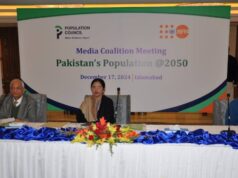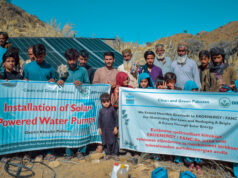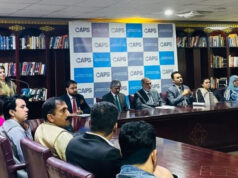QUETTA: Terming family planning a ‘social vaccine’ that has an impact on all other indicators in society, speakers at a seminar here on Tuesday agreed that child spacing can reduce the mother mortality rate by 20 to 25 percent which could be acquired through an informed choice of family planning methods by eligible couples.
Speaking at the unveiling seminar of a study’s finding titled, ‘Understanding and Perception of Client’s Rights on Family Planning Services’ conducted by Jhpiego in around 20 districts following a series of training to reproductive healthcare service providers regarding human rights-based family planning in Balochistan from 2016 to 2019, the speakers unanimously concurred on the point that to limit a couple’s choice on FP method’s is against human rights.
Speaking on the occasion, Dr. Fauzia Assad Country Director Jhpiego said that the study supports evidence that when women have access to family planning information, services and supplies, their quality of lives improves and communities prosper. She said that this is an agreed-upon philosophy that if the investment is made on reproductive health, it would have positive results on all the indicators of life including the economy. She further added that family planning is called social vaccine because it has an impact on all societal indicators, be it education, health or environment.
Sharing the findings of the study, she said that her organization had focused other geographical locations of the country also including Punjab and Sindh but in Balochistan, its work was extended, starting from Quetta to other districts. She particularly mentioned Nushki, Pishin and Killa Saifullah for this extended work, adding that the basic objective on which Maternal and Child Survival Program had worked was strengthening and institutionalizing Long-Acting Reversible Contraceptives (LARC) which include IUCD and Implants. She said that since injections are also counted as LARC so that new entry of syna pares has also been provided in Balochistan.
She said that when capacity is built in a particular area, improving access is also required along with improving monitoring and supervision, adding that monitoring and supervision, being the third objective was already present in the system but technical monitoring aspect was missing in all Pakistan but it was done with the support of all the stakeholders.
Speaking on the occasion, Mr. Saadat Hussain Khokhar extended his special thanks to all stakeholders including Population Welfare Department Government of Balochistan and added that the indicators in Balochistan are higher than the other provinces including total fertility rate (TFR), growth rate and mother mortality rate as per the findings of Pakistan Health and Demographic Survey 2017.
Dr. Rasheed of UNFPA, speaking on the occasion, said that the current facility centres of Population Welfare department in Balochistan cover only 12 percent of the population and therefore, Public Private Partnership was pushed and a letter of understanding was signed between PWD and PPHI wherein more than 600 BHUs of PPHI would be provided contraceptives by PWD to increase the contraceptive prevalence rate in Balochistan. He said that the world cries of climate change and rising temperatures, if they control population, the global temperatures would fall considerably.
The study findings also revealed that the family planning users in Quetta have reached to 19, 952 as a result of the efforts made by MCSP, Jhpeigo and Population Welfare Department.
Share your comments!








